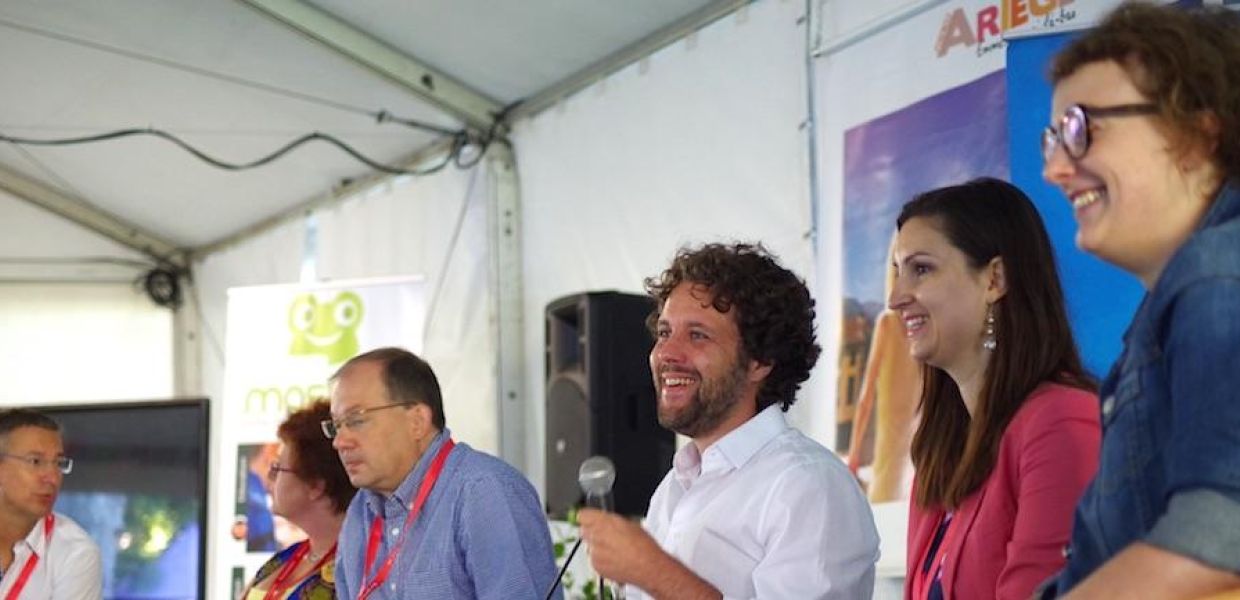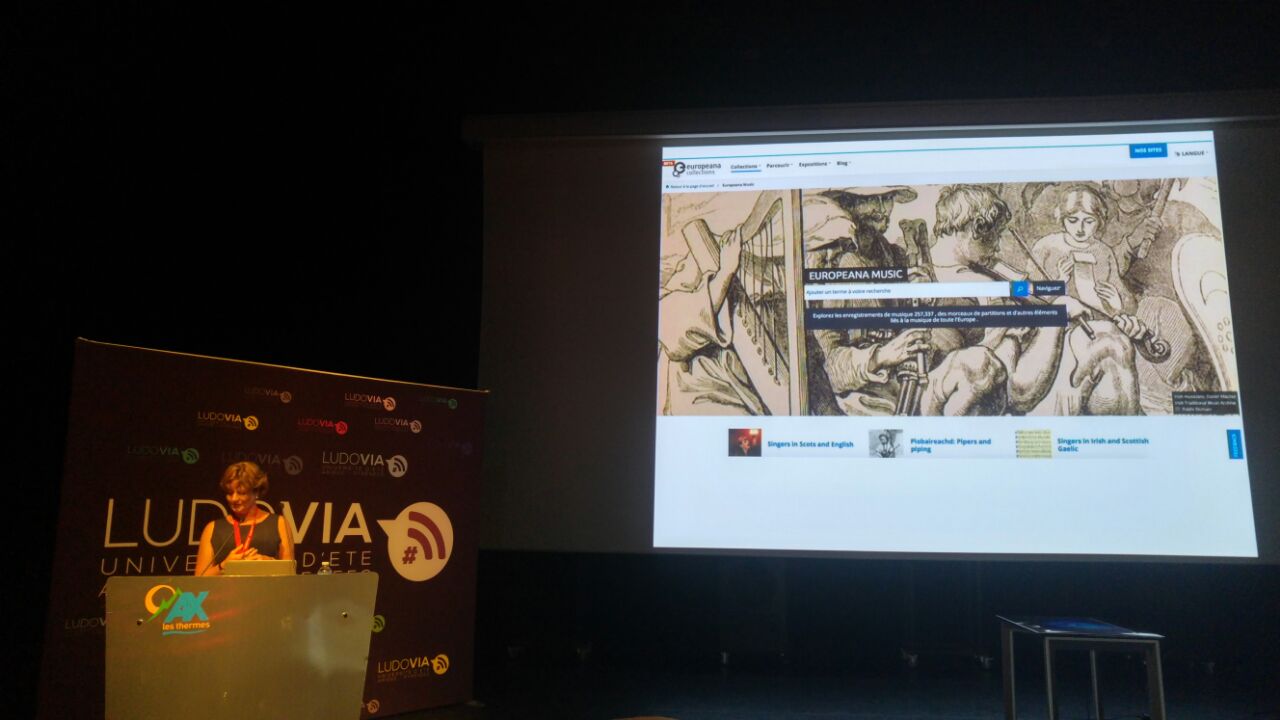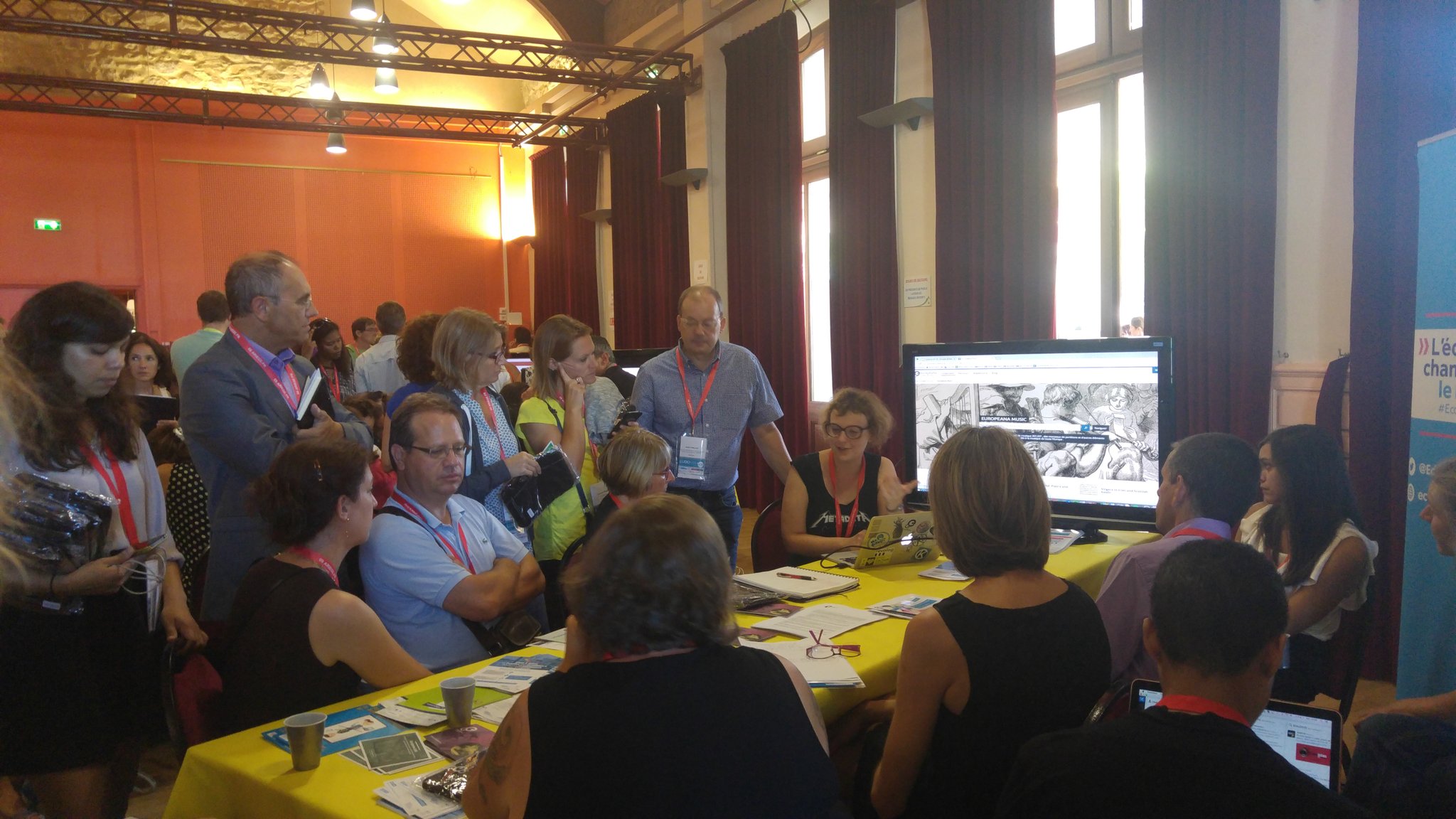Merci pour tout, LUDOVIA #13: Encouraging re-use of digital cultural heritage for education in France

- Title:
- Participants in a round table during LUDOVIA #13. Image: LUDOVIA #13, CC BY-SA
Once a year, teachers, researchers and publishers for primary, secondary and higher education in France gather in the charming commune of Ax-les-Thermes for LUDOVIA, a four-day event focused on digital education. With mountains as the backdrop, educators discuss and learn about new teaching practices to engage and motivate students. On 23-26 August, over 800 participants, of which approximately 150 were speakers, attended LUDOVIA 2016.
The 13th event edition focused on the use of digital resources by educators to develop presence, attention and engagement in classrooms. Europeana was invited to be this year’s guest of honor as recognition of its potential as a digital educational resource and in line with our partnership with the Ministry of Education of France. We brought a delegation comprising of representatives of Europeana and our key educational partner EUROCLIO, the European Association of History Educators.
As a guest of honor, we got great exposure to the French educational communities through sessions on each event day as well as at a dedicated Europeana stand.

Jill Cousins, executive director of Europeana, gives a keynote presentation on Europeana use and goals for education. Image: CC BY-SA Europeana.
On the first day of LUDOVIA our Executive Director Jill Cousins gave a keynote presentation on Europeana and its current and potential use in the field of education. In her speech, she elaborated on our strategy in education, referred to our policy recommendations for education and highlighted examples of applications that have been developed with Europeana content or with the integration of the Europeana API. Joke Van der Leeuw-Roord, founder and special adviser at EUROCLIO, followed with a presentation on the benefits and potential of the Europeana Collections for innovative teaching, having the educational content on Historiana as a case study.
On the second event day, a round table posed the question "Which digital resources develop presence, attention and engagement in the classroom? ". Participants explored where educators can find relevant and openly licensed digital resources and how they can effectively use them for for their classes. Milena Popova from Europeana and Alain Thillay from the French Ministry of Education were among the speakers.
Europeana Collections were also featured in the special Explore Camp workshop on digital pedagogical resources. Aleksandra Strzelichowska from Europeana presented the Europeana 1914-1918 project and the use of this thematic collection in education, including the Europeana WW1 Multi-Touch book and Transcribe, a crowdsourcing initiative for the transcription of digitised historical documents. Steven Stegers, Deputy Director at EUROCLIO, demonstrated Historiana as a useful multimedia tool for history teachers to find relevant, multi-perspective, and cross-border sources (including from Europeana) and design engaging learning activities for their students.

Participants attend an Europeana workshop during LUDOVIA #13. Image: CC-BY-SA Europeana.
On the last day we held a workshop on what Europeana API is and how it can be used in education. Cecile Devarenne, Europeana, introduced the audience into the Europeana API, including practical examples of queries on our portal. Her presentation was followed by three case studies showcasing the usage of the Europeana API in education: the integration of Europeana content in the Learning Resources Exchange portal of European Schoolnet, in the European digital museum for science and technology Inventing Europe and Historiana of EUROCLIO. Take a look at all Europeana presentations on our Slideshare account.
It was rewarding to receive positive feedback from the participants in person as well as on Twitter, where educational professionals showed excitement in discovering Europeana and interest in creatively using our resources in classrooms. We also built connections with potential partners, varying from educational providers, such as Microsoft and Canopé to educational startups.
As next steps, we will actively follow up on these new connections at LUDOVIA to encourage the use of our content and the Europeana API for education. We will also continue working closely with the Ministry of Education in France towards reaching educators in France and increasing the openly licensed content from France for educational purposes on Europeana.
Alain Thillay, Chief of development and dissemination of digital resources (Direction du numérique pour l'éducation [DNE]) sums it up:
“Giving a better knowledge of Europeana ‘s digital resources for teachers or of the APIs to content and service publishers during the 13th annual LUDOVIA event was a real opportunity to promote Europeana4Education.
On this occasion, the Directorate of Digital Technology for Education (DNE) in the Ministry of Education, reaffirmed their interest in continuing dialogue with Europeana that was started during the exchanges on the Eduthèque portal, to facilitate the use and reuse by teachers (and students) of quality digital resources coming from great French cultural and scientific institutions.”
Follow up on #Europeana4Education
